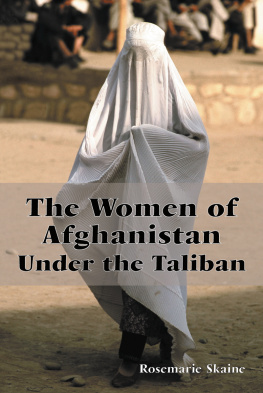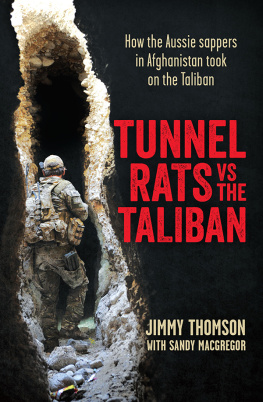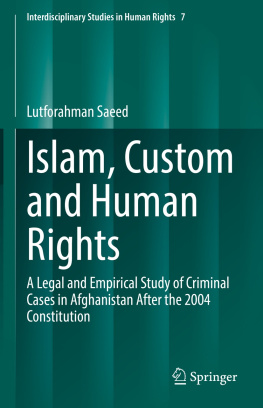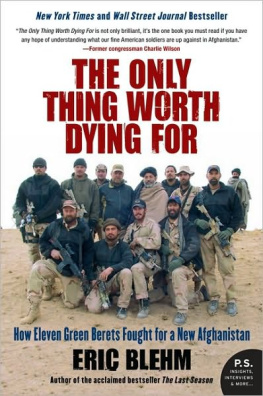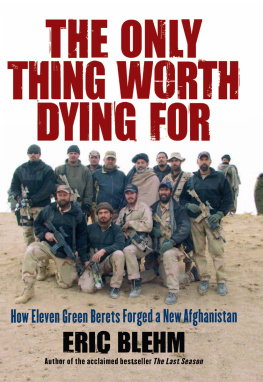

Published in 2009 by The Feminist Press at The City University of New York
The Graduate Center
365 Fifth Avenue, Suite 5406
New York, NY 10016
www.feministpress.org
Copyright 2009 by Barbara Bick
Foreword copyright 2009 by Eden Naby
All rights reserved.
No part of this book may be reproduced or used, stored in any information retrieval system or transmitted in any form or by any means, electronic, mechanical, photocopying, recording, or otherwise without prior written permission from The Feminist Press at The City University of New York, except in the case of brief quotations embodied in critical articles and reviews.
Library of Congress Cataloging-in-Publication Data
Bick, Barbara.
Walking the Precipice: Witness to the Rise of the Taliban / Barbara Bick; Foreword by Eden Naby. 1st ed.
p. cm.
Includes bibliographical references.
ISBN-13: 978-1-55861-919-7
1. AfghanistanHistory1990-2003. 2. AfghanistanHistory1990-2003. Taliban. 4. Bick, Barbara. I. Title.
DS371.3.B53 2009
958.1046dc22
2008009274
13 12 11 10 09 5 4 3 2 1
For the two most important women in my life
My mother, Moma Lil
LILLIAN COLODNY LICHTENSTEIN: a wise, beautiful woman whose activist life was circumscribed by societal parameters
My daughter, Kathy
KATHRINE BICK: brilliant, insatiable reader, loving woman whose life was tragically distorted by mental illness
CONTENTS
Western women who venture into Afghanistan with the expectation of conducting research, interviews, or otherwise investigating political or social situations, must inevitably negotiate the gender issue. As a young United States Peace Corps volunteer in Mazar-i-Sharif during the 1960s, my concession to the near total social segregation of women was a headscarf and modest clothing. But the true toll of a segregated society was the feelings of boredom, isolation, and loneliness that I, along with my Western and Afghan friends, experienced. The social and intellectual lives of Afghan women, even in a major city like Mazar, were meager, entwined mainly with household chores, children, husbands, and other wives.
Not much has improved for Afghan women until very recently. The three trips that Barbara Bick documents here in a personal and highly engaging way contain significant indicators that change is coming about for all Afghan women during the post-9/11 era. Although the security situation remains fragile, and womens education, employment, and basic human rights are threatened with each success of the resurgent Taliban, the determination of so many Afghan women to reconceive the future for their children, their country, and themselves offers hope for several reasons.
Now that they have tasted relative emancipation after five years of Taliban control, women will not easily be shoved back into the oblivion of the burqa again. Nor will Afghan women take for granted the rights they have won, claimed especially through widely circulated declarations of womens rights and the mobilization for the Loya Jirga in 2003. These rights expand upon those previously granted during the 1960s by a liberalizing monarchy and, as Bick witnessed during her 1990 visit, by the Communist government of Najibullah. They build upon a history of womens rights in Afghanistan that the Taliban and other fundamentalists have historically ignored.
Even more important, women in Afghanistans cities recognize the necessity of bridging the chasm that exists between urban elites and their sisters in the countryside. We will have to wait to see how far into eastern and southern Afghanistan this womens awakening has reached, but it is possible to measure it through statistics on womens literacy programs, girls schooling facilities, and the evidence that some of the strictures imposed by Pashtun traditionwhich weighs heavily upon most of Afghanistans nearly thirty-two million people, women and men alikeare being lifted. Afghan womens organizations that were created in refugee situations and in Western diaspora are now an established fact of Afghan life, even if their existence in all parts of the home country may at times appear tenuous.
The current erosion of political stability in Afghanistan began in the 1970s with the simultaneous end of the monarchial system, the rise of ethnic politics, the coalescing of communist movements, and the emergence of Islamist politics. Ten odd years of mujahidin resistance to the Soviet invasion, the subsequent imposition in Kabul of rural gender attitudes by the quarreling mujahidin parties that replaced the Soviet-backed regime, and the ensuing misogynistic rule of the Taliban sent the cause of womens rights and human rights back into medieval times.
Barbara Bicks memoirs cover a substantial part of this period of great change. She opens windows on Afghan women negotiating the shifting political scene in 1990, 2001, and 2003. The span of these thirteen years represents a time of extended civil war that was complicated by ethnic and sectarian animosity. Bick saw the Kabul-based end of Soviet-style social engineering, with its tableaus of womens progress. During her trip to northern Afghanistan in August 2001 she witnessed the efforts of the opposition to create an antidote to the gendered cruelty of the Taliban regime. And finally, in 2003, she was an observer at a conference organized by Afghan women to build support for incorporating womens rights into the countrys constitution, a document that spells policy in Afghanistan today although implementation is another matter. But, as Bicks descriptions of her 2001 visit to the Northern Alliance-controlled region show, a defeat on the battlefield could easily mean a political reversal that drives all women under the burqa. Womens rights are fragile in Afghanistan, shallowly rooted in society, and progress is susceptible to setback with an assassins bullet.
Bick was witness to the recent impact of Islamists who dream of transforming Afghanistan into a Caliphate that will re-create the glory of Islams eighth century dominance. This dream was first expressed in the twentieth century when the rise of Soviet communism sent Muslim refugees out of Central Asia into Afghanistan, the Indian sub-continent, Turkey, and Saudi Arabia. It remains alive among fundamentalist Muslims living in the mountains that spill between Afghanistan and Pakistan, where the Pashtun tribes (and their Al Qaeda guests) remain virtually immune to central government rule. The key to this dream has been, and is again, control of Afghanistan. The country has come to symbolize the one place in the Muslim world that has not been colonized, whose customs have not been tainted by Tsarist Russian, British, French, or other forms of nineteenth century imperialist rule.
Today the struggle in Afghanistan attracts ethnic fighters from Chechnya to Xinjiang. A major symbol of the dream of reestablishing the Caliphate revolves around the suppression of women, or, as these Muslim fighters and their strategists would regard it, upholding the honor of Muslim men.
Much has been written about the role of the United States in supporting the mujahidin factions that spawned the Taliban. Some ten years before Bicks first visit to Afghanistan, in late February 1980, I arranged for a CBS 60 Minutes production team, with anchor Dan Rather, to enter Afghanistan guided by a group of mujahidin. I accompanied the team, serving as a translator. That trip marked the first successful Western TV attempt to enter Afghanistan under Soviet occupation. It was a scene from the resulting 60 Minutes episode, aired in March 1980, that apparently inspired Congressman Charlie Wilson (DTex.) to offer US aid to the mujahidin.
Next page

